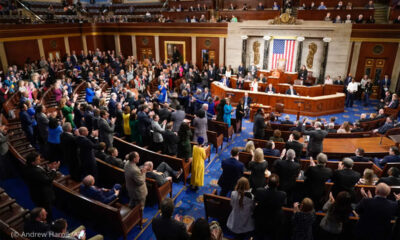Opinion
Nigeria’s inflation has turned to “greedflation” – Farooq Kperogi

Nigeria’s inflation has turned to “greedflation” – Farooq Kperogi
The naira is progressively rebounding against the dollar and petrol prices have remained largely stable, but inflation keeps rising almost unstoppably. Something isn’t adding up. If the initial drivers of inflation have been relatively tamed, why isn’t this reflected in the prices of consumer goods?
The answer appears to be embedded in a new term I’ve learned: “greedflation.” It’s a neologism made by combining “greed” and “inflation” to describe a situation where inflation is driven not just by the usual economic factors like supply and demand imbalances, cost-push factors, or monetary policy, but by corporate greed and the naked exploitation of consumers by conscienceless marketers.
Of course, it needs to be acknowledged from the outset that the ongoing, totally avoidable, unprecedented inflationary pressures on the Nigerian economy were activated by the thoughtless, insensitive, neoliberal, IMF-inspired economic policies of President Bola Ahmed Tinubu. There’s no way to sugarcoat it.
When you unleash a double whammy of petrol subsidy removal and a boneheaded depreciation of the naira (deceptively called “floating,” which is actually “sinking”) in a rudimentary, import-dependent economy like Nigeria’s, you inevitably open the floodgates to soul-crushing hyperinflation—such as Nigeria is going through now.
Fortunately, Tinubu seems to be seeing the light now. He has so far bucked pressures from the IMF to allow petrol prices to climb to over 1,000 naira per liter.
The government had denied Daily Trust’s September 2023 report that it had resumed paying subsidies through the backdoor to keep the current pump price of petrol. Five months later, the IMF confirmed the report.
The IMF regretted that Tinubu had “capped retail fuel and electricity prices” in order to “ease the impact of rapidly rising inflation on living conditions, thus partially reversing the fuel subsidy removal.”
The IMF doesn’t want the government to “ease the impact of rapidly rising inflation,” so it “advised the administration of President Tinubu to completely stop the payment of subsidies on petrol to free funds to run the government,” according to Daily Trust of February 14.
“Running the government” is more important to the IMF than the wellbeing of the people. People can drop dead on the streets as a consequence of starvation that subsidy removal instigates. The IMF doesn’t care. In fact, that is what it wants.
READ ALSO:
- Police rescue abducted church worshipper in Ogun
- REVEALED! NFF plans to hire France women’s team manager as Super Eagles coach
- Naira exchanges for N1,280/$ on parallel market
Well, Tinubu’s Special Adviser on Energy, Mrs. Olu Veŕheijen, has called the bluff of the IMF— at least for now. On March 8, in defense of partial subsidies to stop petrol prices from increasing further, she said “the government has the prerogative to maintain price stability to address social unrest. They reserve the right to intervene.
“If the government feels that it cannot continue to allow prices to fluctuate due to high inflation and exchange rates, the government reserves the right to intervene intermittently…”
The naira is also being rescued with subsidies after it drowned in the shark-infested waters of the global currency market in the aftermath of its “floating”— at the prompting of the IMF, of course. Is Tinubu finally growing some testicular fortitude against the racist, callous, anti-people bullies at the IMF? It’s too early to tell.
Well, why are the effects of the thawing of the neoliberal nonsense that Tinubu started with not showing in the prices of goods? It’s partly down to the unrestrained avarice of sellers. This phenomenon is happening even here in the United States, although it seems to be less vicious than what I am sensing in Nigeria.
The traditional term to describe the act of taking advantage of consumers by arbitrarily jacking up prices is “price gouging.”
The idea behind this concept is that companies, retailers, and street sellers (in the case of developing economies like Nigeria) take advantage of certain conditions (such as supply chain disruptions, increased demand, economic recovery phases, natural disasters, etc.) to raise prices beyond what would be justified by cost increases alone, thereby increasing their profit margins at the expense of consumers.
Nigerians experienced this phenomenon in its rawest, crudest, most rapacious form in May 2023 when petrol marketers jacked up the pump price of petrol from less than 200 naira per liter to more than 500 naira per liter—on old stock that was subsidized by taxpayers’ money—shortly after President Tinubu announced that petrol subsidies were gone for good.
Greedflation is most observable, according to experts, in industries with a few dominant players or where there is a lack of competition, such as in the building sector in Nigeria. Interestingly, the government has been able to successfully persuade cement manufacturers to bring down the prices of cement, so this fact isn’t applicable across the board.
In the informal economy, prices of goods and services remain unusually high even when the factors that propelled them in the first place are easing. So, while the government is still to blame for the current inflation, the primitive acquisitive impulses of marketeers and profiteers help to make this worse.
As I pointed out before, this isn’t exclusive to Nigeria. Here in the United States, we’re also contending with greedflation and even what has been called “shrinkflation.” Shrinkflation occurs when companies, instead of increasing the prices of goods, shrink the quantities they put in the packages of the goods, which forces consumers to buy more.
So, there is a shrinkage in quantity, but not in price, and companies that do this hope you won’t notice. In a February 11 video, President Joe Biden called shrinkflation a “rip-off” and urged companies to put a stop to it.
READ ALSO:
- FG shifts Port Harcourt-Aba train launch to April, connects to two seaports
- Ningi will join us in few days, says Senate President
- Murdered soldiers: Military moves Delta monarch to Abuja
For example, the price of a bag of okra (as Oyinbo people call okro) at Walmart, which I regularly buy for my “swallow,” hasn’t changed, but the quantity has. Two bags used to be enough for a week’s worth of soup. Now I need four.
American consumers are fighting greedflation and shrinkflation by cutting back on spending, finding cheaper alternatives to products they habitually used, and ditching name brands for generic and cheaper brands.
This has translated to drastic declines in sales for many companies, which is forcing them to reduce the prices of their products to attract more sales.
I don’t know if Nigerian consumers have the alternatives that Americans have to cause sales declines in the products of greedy marketers, which might then force them to bring down their prices. Maybe not.
And that’s why governments in Nigeria have to be extra careful to not implement policies that can trigger inflation because prices of goods in Nigeria are like our ages: when they go up, they never come down.
Of course, there are exceptions. But, for the most part, petrol and commodity price hikes in Nigeria are often permanent. That’s how you know that “deregulation,” “liberalization,” “market forces,” etc. that Nigerian political elites influenced by right-wing economics like to spout are all scams. Any economy where prices go up and never come down for any reason is a giant swindle.
The Tinubu government that instigated this preventable downturn in the economy by playing the IMF playbook has a responsibility to help tame the monster of greedflation that’s devouring our people.
Strengthening the capacity of regulatory bodies to monitor and penalize price manipulation and collusion among businesses can help control unjustified price increases. Educating consumers about their rights and how to report unfair pricing practices can empower them to fight against greedflation—in addition to ditching exploitative marketers where they can.
The government can also borrow a leaf from governments in the West, which use tax policies to incentivize businesses to maintain reasonable price levels, especially for essential goods and services.
Fighting greedflation requires the commitment of both the government and conscientious elements in the private sector, along with the active participation of civil society, to create a more stable, fair, and competitive economic environment.
Nigeria’s inflation has turned to “greedflation” – Farooq Kperogi
Farooq Kperogi is a renowned Nigerian newspaper columnist and United States based Professor of Media Studies.
Opinion
El Rufai’s Arise News mind game with Ribadu, By Farooq Kperogi

El Rufai’s Arise News mind game with Ribadu, By Farooq Kperogi
El Rufai’s Arise News mind game with Ribadu, By Farooq Kperogi
Opinion
Oshiomhole: Behold the 13th disciple of Christ

Oshiomhole: Behold the 13th disciple of Christ
Opinion
AFCON 2025: Flipping Content Creation From Coverage to Strategy

AFCON 2025: Flipping Content Creation From Coverage to Strategy
By Toluwalope Shodunke
The beautiful and enchanting butterfly called the Africa Cup of Nations (AFCON) emerged from its chrysalis in Khartoum, Sudan, under the presidency of Abdelaziz Abdallah Salem, an Egyptian, with three countries—Egypt, Sudan, and Ethiopia—participating, and Egypt emerging as the eventual winner.
The reason for this limited participation is not far-fetched. At the time, only nine African countries were independent. The remaining 45 countries that now make up CAF’s 54 member nations were either pushing Queen Elizabeth’s dogsled made unique with the Union Jack, making supplications at the Eiffel Tower, or knocking at the doors of the Palácio de Belém, the Quirinal Palace, and the Royal Palace of Brussels—seeking the mercies of their colonial masters who, without regard for cultures, sub-cultures, or primordial affinities, divided Africa among the colonial gods.
From then until now, CAF has had seven presidents, including Patrice Motsepe, who was elected as the seventh president in 2021. With more countries gaining independence and under various CAF leaderships, AFCON has undergone several reforms—transforming from a “backyard event” involving only three nations into competitions featuring 8, 16, and now 24 teams. It has evolved into a global spectacle consumed by millions worldwide.
Looking back, I can trace my personal connection to AFCON to table soccer, which I played alone on concrete in our balcony at Olafimihan Street—between Mushin and Ilasamaja—adjacent to Alafia Oluwa Primary School, close to Alfa Nda and Akanro Street, all in Lagos State.
Zygmunt Bauman, the Polish-British sociologist who developed the concept of “liquid modernity,” argues that the world is in constant flux rather than static, among other themes in his revelatory works.
For the benefit of Millennials (Generation Y) and Generation Z—who are accustomed to high-tech pads, iPhones, AI technologies, and chat boxes—table soccer is a replica of football played with bottle corks (often from carbonated drinks or beer) as players, cassette hubs as the ball, and “Bic” biro covers for engagement. The game can be played by two people, each controlling eleven players.
I, however, enjoyed playing alone in a secluded area, running my own commentary like the great Ernest Okonkwo, Yinka Craig, and Fabio Lanipekun, who are all late. At the time, I knew next to nothing about the Africa Cup of Nations. Yet, I named my cork players after Nigerian legends such as Segun Odegbami, Godwin Odiye, Aloysius Atuegbu, Tunji Banjo, Muda Lawal, Felix Owolabi, and Adokiye Amiesimaka, among others, as I must have taken to heart their names from commentary and utterances of my uncles resulting from sporadic and wild celebrations of Nigeria winning the Cup of Nations on home soil for the first time.
While my connection to AFCON remained somewhat ephemeral until Libya 1982, my AFCON anecdotes became deeply rooted in Abidjan 1984, where Cameroon defeated Nigeria 3–1. The name Théophile Abéga was etched into my youthful memory.
Even as I write this, I remember the silence that enveloped our compound after the final whistle.
It felt similar to how Ukrainians experienced the Battle of Mariupol against Russia—where resolute resistance eventually succumbed to overwhelming force.
The Indomitable Lions were better and superior in every aspect. The lion not only caged the Eagles, they cooked pepper soup with the Green Eagles.
In Maroc ’88, I again tasted defeat with the Green Eagles (now Super Eagles), coached by the German Manfred Höner. Players like Henry Nwosu, Stephen Keshi, Sunday Eboigbe, Bright Omolara, Rashidi Yekini, Austin Eguavoen, Peter Rufai, Folorunsho Okenla, Ademola Adeshina, Yisa Sofoluwe, and others featured prominently. A beautiful goal by Henry Nwosu—then a diminutive ACB Lagos player—was controversially disallowed.
This sparked outrage among Nigerians, many of whom believed the referee acted under the influence of Issa Hayatou, the Cameroonian who served as CAF president from 1988 to 2017.
This stroll down memory lane illustrates that controversy and allegations of biased officiating have long been part of AFCON’s history.
The 2025 Africa Cup of Nations in Morocco, held from December 21, 2025, to January 18, 2026, will be discussed for a long time by football historians, raconteurs, and aficionados—for both positive and negative reasons.
These include Morocco’s world-class facilities, the ravenous hunger of ball boys and players (superstars included) for the towels of opposing goalkeepers—popularly dubbed TowelGate—allegations of biased officiating, strained relations among Arab African nations (Egypt, Algeria, Tunisia, and Morocco), CAF President Patrice Motsepe’s curt “keep quiet” response to veteran journalist Osasu Obayiuwana regarding the proposed four-year AFCON cycle post-2028, and the “Oga Patapata” incident, where Senegalese players walked off the pitch after a legitimate goal was chalked off and a penalty awarded against them by DR Congo referee Jean-Jacques Ndala.
While these narratives dominated global discourse, another critical issue—less prominent but equally important—emerged within Nigeria’s media and content-creation landscape.
Following Nigeria’s qualification from the group stage, the Super Eagles were scheduled to face Mozambique in the Round of 16. Between January 1 and January 3, Coach Eric Chelle instituted closed-door training sessions, denying journalists and content creators access, with media interaction limited to pre-match press conferences.
According to Chelle, the knockout stage demanded “maximum concentration,” and privacy was necessary to protect players from distractions.
This decision sparked mixed reactions on social media.
Twitter user @QualityQuadry wrote:
“What Eric Chelle is doing to journalists is bad.
Journalists were subjected to a media parley under cold weather in an open field for the first time in Super Eagles history.
Journalists were beaten by rain because Chelle doesn’t want journalists around the camp.
Locking down training sessions for three days is unprofessional.
I wish him well against Mozambique.”
Another user, @PoojaMedia, stated:
“Again, Eric Chelle has closed the Super Eagles’ training today.
That means journalists in Morocco won’t have access to the team for three straight days ahead of the Round of 16.
This is serious and sad for journalists who spent millions to get content around the team.
We move.”
Conversely, @sportsdokitor wrote:
“I’m not Eric Chelle’s biggest supporter, but on this issue, I support him 110%.
There’s a time to speak and a time to train.
Let the boys focus on why they’re in Morocco—they’re not here for your content creation.”
From these three tweets, one can see accessibility being clothed in beautiful garments. Two of the tweets suggest that there is only one way to get to the zenith of Mount Kilimanjaro, when indeed there are many routes—if we think within the box, not outside the box as we’ve not exhausted the content inside the box.
In the past, when the economy was buoyant, media organisations sponsored reporters to cover the World Cup, Olympics, Commonwealth Games, and other international competitions.
Today, with financial pressures mounting, many journalists and content creators seek collaborations and sponsorships from corporations and tech startups to cover sporting events, who in turn get awareness, brand visibility, and other intangibles.
As Gary Vaynerchuk famously said, “Every company is a media company.” Yet most creators covering AFCON 2025 followed the same playbook.
At AFCON 2025, most Nigerian journalists and content creators pitched similar offerings: on-the-ground coverage, press conferences, team updates, behind-the-scenes footage, analysis, cuisine, fan interactions, and Moroccan cultural experiences.
If they were not interviewing Victor Osimhen, they were showcasing the stand-up comedy talents of Samuel Chukwueze and other forms of entertainment.
What was missing was differentiation. No clear Unique Selling Proposition (USP). The result was generic, repetitive content with little strategic distinction. Everyone appeared to be deploying the same “Jab, Jab, Jab, Hook” formula—throwing multiple jabs of access-driven content in the hope that one hook would land.
The lesson is simple: when everyone is jabbing the same way, the hook becomes predictable and loses its power.
As J. P. Clark wrote in the poem “The Casualties”, “We are all casualties,” casualties of sameness—content without differentiation. The audience consumes shallow content, sponsors lose return on investment, and creators return home bearing the “weight of paper” from disappointed benefactors.
On November 23, 1963, a shining light was dimmed in America when President John F. Kennedy was assassinated.
As with AFCON today, media organisations sent their best hands to cover the funeral, as the who’s who of the planet—and if possible, the stratosphere—would attend. Unconfirmed reports suggested that over 220 VVIPs were expected.
While every newspaper, radio, and television station covered the spectacle and grandeur of the event, one man, Jimmy Breslin, swam against the tide. He chose instead to interview Clifton Pollard, the foreman of gravediggers at Arlington National Cemetery—the man who dug John F. Kennedy’s grave.
This act of upended thinking differentiated Jimmy Breslin from the odds and sods, and he went on to win the Pulitzer Prize in 1986.
Until journalists and content creators stop following the motley and begin swimming against the tide, access will continue to be treated as king—when in reality, differentiation, aided by strategy, is king.
When every journalist and content creator is using Gary Vaynerchuk’s “Jab, Jab, Jab, Hook” template while covering major sporting events, thinkers among them must learn to replace one jab with a counterpunch—and a bit of head movement—to stay ahead of the herd.
Toluwalope Shodunke can be reached via tolushodunke@yahoo.com
-

 Education2 days ago
Education2 days agoCheck Your Name: UNILORIN Releases Updated NELFUND Refund List for 2024/2025 Students
-

 News2 days ago
News2 days agoOsogbo Sons and Daughters Mark 5th Anniversary with Awards, Political Undertones
-

 metro3 days ago
metro3 days agoWoman Arrested Over Murder of Nigerian E-Hailing Driver in South Africa
-

 metro20 hours ago
metro20 hours agoUS Freezes Assets of Eight Nigerians Over Boko Haram, ISIL, Cybercrime Links
-

 News2 days ago
News2 days agoAfenifere Calls for Immediate Take-Off of State Police as Terror Threats Rise in Yorubaland
-

 metro3 days ago
metro3 days agoBoko Haram Terrorists Release Video of 176 Abducted Kwara Residents
-

 metro21 hours ago
metro21 hours agoTerror in Lagos Traffic: Cutlass Gang Unleashes Mayhem on Mile 12–Ketu Road
-

 metro2 days ago
metro2 days agoUS Military Boosts Support for Nigeria’s Fight Against Insurgency With Ammunition, Troop















